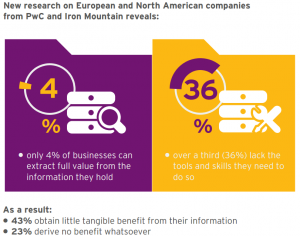For some businesses it’s logical and for others a complete mystery that in order to execute a digital transformation process and conduct business in today’s digital world, they need digital and digitized information. Success is unlikely if they are unable to use information and data for maximum benefit improving business processes such as enhancing the customer experience.
The new digital ecosystem is made up of numerous elements working in conjunction with each other, information is the very core. According to the IDC, using the right information at the right time in the right way is “a critical enabler of the digital transformation of enterprises”. Again, this might seem like common sense, but it is not, as some businesses continue to struggle to use the information that they have effectively.
If an organization is going to make digital transformation a core feature of their strategy, then a more intimate understanding of the picture painted by the information and what role it can play in the transformation process.
Gaps that need to be plugged
As the digital transformation economy spreads, how prepared is your business for the changes it brings? The reality is that there is still a lot that needs to be done in terms of preparation. The question is: where to begin with these preparations?
A lot of discussion has circulated on various platforms about the impending transformation. Predictions have been bandied about and a raised awareness of the importance of analytics and cognitive computing as part of the preparation for this transition. However, there are still massive challenges in managing and understanding content and information.
Big gaps exist in several important areas. First, is the disassociation between the role and reality of information compared to the use and leveraging of information. There are many companies in this spot. A recent study by Forrester and PwC showed that only 4% of all companies in the North America and Europe can extract the full value from the information they hold. It may it be a lack of the appropriate tools or the proper skills, as 36% of the companies stated, or a lack of awareness at the C-level for those problems. One thing is for sure, it is important to address these challenges before progress can be made.

Digital transformation – crunching the numbers
Digital transformation is important for any contemporary business. At a forum held recently, Forrester tweeted the well-known, but still chilling fact that of the 87% of firms involved in digital transformation, only 25% will successfully reach the aims they have set for themselves.
IDC emphasizes the role that information plays and the ability to interpret and gain knowledge from it. These are essential points in a world where digital strategies are becoming central to business innovation and growth strategies. They forecast the following:
- According to the IDC, 65% of large businesses will make the commitment to becoming information-based because they comprehend the role that information plays in transformation, innovation, customer experience and other areas. They warn against confusing commitment with capability.
- Intangible capital will become a direction to head towards for organizations. Capital will increasingly become about relationships, people and information in their functions as connectors. The ecosystem is changing rapidly some of the things to keep in mind during this change are- data, customer experience, innovation capacity, speed, scalability and agility.
- The IDC says that 60% of the G20 will increase their earnings two-fold by 2020. They will achieve this by switching from human-based delivery to software-based delivery.
- It is no longer as useful to think of leveraging information as simply an enabler for digital transformation. It’s becoming important to think of the activity as essential to the digital transformation economy.
The IDC further asserts that half of the customers in the market regularly interact with services that have cognitive computing at their core source.


